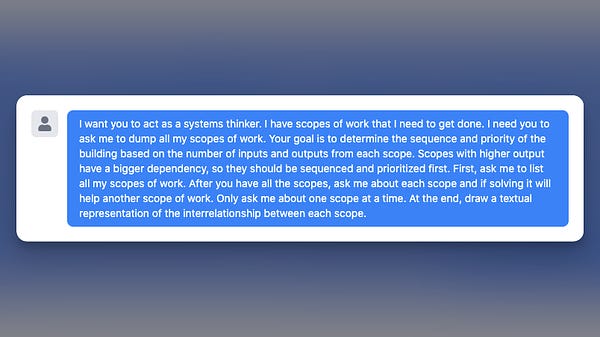🎾 No More Advice On Stakeholder Management + Analytics Debt, Work Sequencing, AI Features & 2023 Product Survey Insights
+ 1 meme
Estimated read time: 1 minute 50 seconds.
This is Sunday 1-1-2-3 with George.
Welcome to the 73rd edition.
We’re in April now. AI progress is marching on. Companies are firing people left & right. And here I am, in your inbox, making a mess again! Hope today’s edition helps. If not, don’t forget to unsubscribe!
Today we have:
Your Last Piece of Advice On Stakeholder Management
What Is Analytics Debt?
Prompts To Sequence Your Work
Questions To Ask Before Building AI Features
Key Takeaways From The Department of Product's State of Product Survey 2023
+ 1 meme.
📚 Your Last Piece of Advice On Stakeholder Management
This week, I asked:

A long-time follower, Ricardo, said, "Stakeholder management, usually taught superficially but can be very complex."
So, I went nuts on my library to see what I've got on this topic.
And you know what?
What I have is all the same advice. Literally, over 20+ articles I've saved over the years, all advocating the same thing.
So, here's the algorithm:
Make a list of people to influence (or not).
Decide how you'll deal with them.
Deal with them.
Here are some good articles to read anyway:
Maximizing Product Success through Effective Stakeholder Management
Lessons On Stakeholder Management For Large Cross-Functional Projects
Now, why is this so damn difficult?
ChatGPT would say, "It's because people are difficult, they come in different shapes and sizes, blah blah blah." Yes, of course, and obvious. What do you do with that?
To me, there are two main branches of this problem:
Functional
Emotional
Functional: Sometimes it's hard to make a consistent list to even start with. People move around, organizations change, and if we're talking about external stakeholders, then that can be a complete black box.
Point is: it's hard to even get started. I once had to map the whole organization by hand in Miro because Workday is a piece of shit software invented by Satan it was too difficult to do in Workday.
Do you have a stakeholder map yet? Is it hard to make? You might be failing at step one. Focus to solve this first.
Emotional: Is this how we make friends: by making a map of people and deciding if we want to be friends with them? Do we want to be friends with anyone? Do we feel weird about our role, our place in the world, our emotions in general? I mean, you can see how this bean-counting robotic approach of "scan humans, create algorithm, engage humans" might just not be working out for our soft brains.
My best advice is to just put in the reps at least once, following the three steps I outlined above. Just do this once.
Your map, your strategy, and the ways you'll engage will be suboptimal. But maybe you'll do it again, and then again, and maybe you'll get better at it over time.
I just finished 75 Hard, and what seemed like an impossible list of tasks on Day 1 was finished by noon on Day 75.
Good luck.
Finally, get this Stakeholder Management Stack from
👀 What Is Analytics Debt?
Having burnt myself too many times now going into orgs that mostly go by gut without any analytics instrumentation, I now have a rule to ask probing questions during interviews, to pull up user data on the spot - and seeing how much (relatively) people struggle.
The bad news is that everyone struggles - analytics is usually a last-minute thought for orgs of all sizes.
Here’s an even better explainer on how to approach this question, and why it matters (especially if you’re a growth PM):
🍪 Quick Bites
A Simple Prompt To Figure Out What To Work On In What Order


Questions To Ask Before Building AI Features In Your Products

Key Takeaways From The Department of Product's State of Product Survey 2023

😂 Meme
That's a wrap for today. Stay focused and see you next week! If you want more, be sure to follow me on Twitter (@nurijanian)
😀 What did you think of this week's newsletter?
Loved it | Great | Good | Meh | Bad
If you enjoyed this, please consider sharing it with a friend. If a friend sent you this, get the next newsletter by signing up below.
Who's George?
I’m an underdog product manager.
Product management in New Zealand (where I live) is still a relatively immature discipline. I also came into it late via data science and UX. I may be older than others, but I often feel like a rookie.
To become better at my craft, I learn and explore new ideas relentlessly.
Then I share high-quality, tried-and-true ideas that can be used right away.
How I can help you:
If you want to feel smarter, I’ve compiled my best actionable finds in prodmgmt.world.
If you need to figure out prioritization in your role, get The Big Book of Prioritization.
See you next week.
— George.





Enjoyed the breakdown of All Stakeholder Management Advice Ever, and I think you could go further. My take is that the simplistic nature of the advice reflects a general flaw in frameworks: they promise you mechanistic control of the world, but it’s a lie.
Did you see the Wire/politics post from Hang Xu recently? It was about designers, sure, but really it’s the same thing: the job is politics! Politics is people! People are messy and complex (and don’t fit in a matrix or a framework)! People aren’t a task to check off in Jira.
https://www.linkedin.com/feed/update/urn:li:activity:7047208257727193088?updateEntityUrn=urn%3Ali%3Afs_feedUpdate%3A%28V2%2Curn%3Ali%3Aactivity%3A7047208257727193088%29
Anyway, glad you’re flagging it in this post, dude. I’d say an area with some useful ideas about the people side of things is complexity science and naturalising sense-making - for example methods to stimulate informal networks. They don’t give you a way to “manage stakeholders” ... but maybe stakeholders don’t particularly want to feel managed!